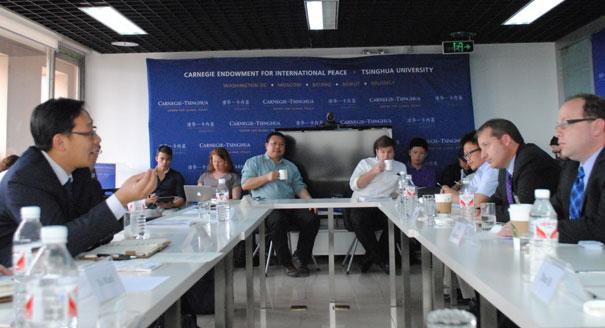Registration
You will receive an email confirming your registration.
As China emerges as a regional power with growing global influence, the United States seeks to engage it on a range of international security issues. However, Beijing often interprets U.S. cooperative overtures, especially the U.S. ‘Pivot to Asia,’ as an attempt to impede China’s rise. How China assumes global leadership will redefine the global security architecture.
Carnegie-Tsinghua’s Paul Haenle hosted a roundtable discussion featuring Dan Blumenthal, director of Asian Studies at the American Enterprise Institute, and several Chinese scholars. The discussants addressed the future of Chinese and U.S. power and their evolving roles in the Asia-Pacific.
How to Define Power in a Rising China
Blumenthal explained that the modern state of China is complex and sometimes contradictory. This has further complicated the U.S.-China relationship.
- Inexplicable China: Di Dongsheng, a professor at Renmin University, described China as a “mixture of genes,” with inherent cultural genes from Asia, political genes from the Soviet Union, and economic genes from the United States. He added that China has not explicitly articulated what it wants and how these various legacies from the Asia, Soviet Union, and the United States can work together to form today’s China. Blumenthal suggested that there are = three different identities for China: the modern, powerful China that is the focus in Washington; the developing China that struggles with social instability; and the China that is aggressive on issues like cybersecurity.
- Mutual Mistrust: Geng Xiao, director of research at the Fung Global Institute, explained that the Chinese interpret the U.S. pivot to Asia as a message to East Asian powers like China that they need to adopt U.S. ideologies. Fan Jishe, a scholar at the Chinese Academy of Social Sciences, added that failure to resolve long-standing problems, such as territorial disputes with the Philippines or a nuclear North Korea, could add tension to the Sino-U.S. relationship. Blumenthal responded that despite Chinese suspicions of U.S. intentions, Washington actually advocates for China to assume a greater global role, especially as domestic support is growing within the United States to adopt an isolationist policy. He argued that China’s largest concern should be the consequences of the United States exercising too little power globally, rather than too much.
- Changing Chinese Foreign Policy? Fan cautioned that China is now less willing to tolerate challenges from the United States, particularly on matters related to human rights and Taiwan. In regards to any significant shift in Chinese foreign policy, Fan noted that much of Chinese foreign policy is set through consensus in official doctrine. It is difficult for any leader to change without first establishing firm support within the Chinese Communist Party.
The Future of Power
- Shrinking U.S. Role: Zhou Qi, a scholar at the Chinese Academy of Social Sciences, explained that the United States can no longer unilaterally act to solve international problems in the globalized world. Blumenthal added that the United States is trying to untangle its complex foreign ties. Since 1972, he noted, U.S. foreign policy toward China has sought to strengthen and shape that country into a responsible international player. However, Zhou said that the differences in ideology and values between China and the United States prevent stronger bilateral relations. Several discussants agreed that such differences between the two countries need to be addressed in order to form a competitive, not confrontational, relationship between Beijing and Washington.
- Hard versus Soft Power: Blumenthal posed a question about Beijing’s capability and its desire to take on increased security responsibilities in the Middle East, in maritime trading lanes, and in nuclear proliferation. Geng responded that China will primarily lead via soft power. However, Blumenthal noted that that soft power is insufficient to handle security threats like the one previously posed by Osama Bin Laden.
- U.S. Role in Asia-Pacific Security: Blumenthal discussed the key Asia-Pacific issues that remain top U.S. priorities. Its traditionally strong alliance with Japan, North Korea’s nuclear threat, and whether Japan will become a nuclear power are all factors, Blumenthal explained, that guide U.S. Asia-Pacific policy.
Discussants included: Yu Wanli, Wang Dong, Fan Jishe, Yan Danzhi, Dong Qingling, Di Dongsheng, Zhou Qi, Geng Xiao
